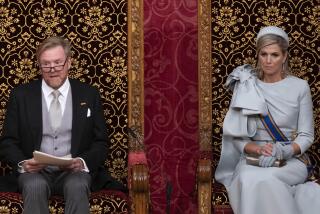De Klerk Urges Power-Sharing Policy Under New Constitution : South Africa: Majority rule holds ‘great danger’ for minority rights and values, he tells Parliament.
- Share via
JOHANNESBURG, South Africa — President Frederik W. de Klerk on Tuesday put the first strokes on his eventual negotiating stance for a new constitution, telling Parliament that his government rejects black majority rule as “unsuitable for South Africa” and will push instead for some form of power sharing.
“We believe majority rule . . . leads to domination and even to the oppression of minorities,” De Klerk said, reiterating the long-held view of his white minority-led government. “Majority rule offers a solution only to whomever might form the majority but holds great dangers for minority rights and values.
“We are convinced that power sharing based on full participation by everyone, as well as protection against domination, is the only workable answer,” he added.
The president’s address, opening four days of debate on his budget in Cape Town, repeated many themes now familiar to South Africans, including De Klerk’s promise to do away with apartheid, the country’s system of racial segregation and white domination. He also repeated his promise to submit any new constitution to a nationwide referendum.
But it was the first time since he eased restrictions on political expression in February that De Klerk had publicly outlined the position that he will take in preliminary talks with the African National Congress next month and at the negotiating table if he succeeds in luring black leaders to help him draw up a new constitution.
Although leaving room for compromise in the negotiating process, De Klerk drew a distinction between his government’s support for universal franchise and its opposition to majority rule.
He said he envisions “a vote of equal value for every adult citizen” but in a system of shared power that would prevent the country falling “prey to one section of the population at the expense of the rest.” Such a system, he suggested, would include provisions for settling controversial matters by consensus rather than majority vote.
“While we are honest and genuine in our quest to create equal opportunities for all, we are not prepared to destroy existing rights or allow them to be destroyed,” De Klerk said. In an attempt to reassure whites frightened by the prospect of a black-controlled government, he added: “Those who enjoy full political rights at present are not prepared to bow out apologetically from the stage of history.”
The nation’s 27 million blacks, who outnumber whites 5 to 1, currently have no vote in national affairs. The ANC, the primary black nationalist group, has demanded a system of one person-one vote majority rule and has rejected power-sharing proposals advanced by the government in the past. However, Nelson R. Mandela, deputy ANC president, has suggested that some protection for the rights of whites might be necessary in a new constitution.
De Klerk criticized the ANC’s “continued commitment to the armed struggle, even if it were merely rhetorical,” as an obstacle to peaceful negotiations. And he lashed out at the right-wing Conservative Party for fanning irrational white fears of reform. The Conservatives’ desire for an exclusive white homeland “has no practical value,” the president added.
The ANC has refused to abandon its armed struggle until the government promises to end violence against black activists and launch steps toward dismantling apartheid. It has agreed to send an 11-person delegation to meet De Klerk next month to discuss obstacles to formal negotiations.
De Klerk said a new constitution should include an equal vote for all adult citizens, a bill of rights, an independent judiciary and a requirement that all controversial matters be decided by consensus.
“Power sharing differs from majority rule,” De Klerk said. “It is fair to all because nobody is able to grab all the power and dominate the others, even though everybody has the vote.”
More to Read
Sign up for Essential California
The most important California stories and recommendations in your inbox every morning.
You may occasionally receive promotional content from the Los Angeles Times.














